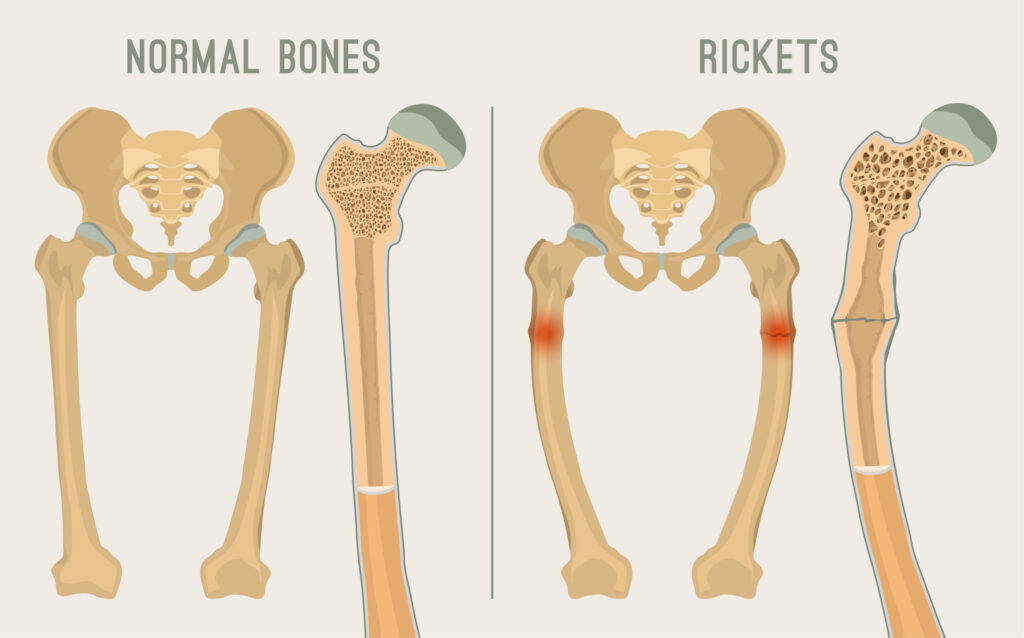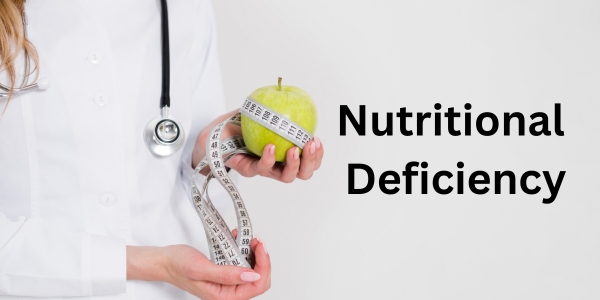Nutritional deficiency diseases are the health problem which arises due to the lack of essential nutrients in the diet. When the body does not receive an adequate amount of these nutrients, it can lead to a number of health conditions. These nutrients include vitamins, proteins, carbohydrates, minerals, and fats.
SCURVY

Scurvy is a disease that occurs when your body does not receive enough Vitamin C through diet. It is a rare nutritional deficiency disease resulting from severe Vitamin C deficiency. The main reason for scurvy is not eating fresh fruits and vegetables.
Importance of Vitamin C
Vitamin C is a water-soluble vitamin that is essential for good health. It is necessary for many body activities, and its significance arises from its action as an antioxidant and its participation in multiple metabolic processes. Here are a few key justifications why Vitamin C is important
Anti-Oxidant Action:
Vitamin C is a powerful antioxidant that promotes cellular by protecting the cells from harmful radicles. Vitamin C also helps to generate other antioxidants like Vitamin E.
Healing of Wounds:
Vitamin C plays an essential role in the healing of wounds as it helps to produce new skin cells, blood vessels, and connective tissues.
Collagen Production:
Vitamin C helps in collagen production which plays a structural role in different body tissues and helps in maintaining healthy skin.
Stimulates Immune System:
Vitamin C plays a vital role in boosting a healthy immune system by enhancing the function of various immune cells. It also induces the production of antibodies that detect pathogens and neutralize them
Regulation of Neurotransmitters Synthesis:
Vitamin C regulates the release of Neurotransmitters such as dopamine, epinephrine, and norepinephrine. Thus, Vitamin C plays a role in mood regulation and stress conditions.
Our bodies cannot produce or store vitamin C. It is necessary to fulfill Vitamin C requirements through diet and nutritional supplements.
Cause of Scurvy
The primary causes of scurvy are as follows:
Diet Deficient of Vitamin C:
A vitamin C deficient diet may often lead to scurvy.
Poor Nutrition:
People with an unbalanced diet are at higher risk of developing Scurvy. People who rely on processed food rather than fresh food have chances to develop scurvy.
Restricted Availability of Fresh Food:
Scurvy is more likely to occur in people who have limited access to fresh fruits and vegetables which are the key source of Vitamin C.
Symptoms of Scurvy
Pet symptoms of Scurvy are:
- Tiredness, Fatigue, and Weakness
- Swollen and Bleeding gums (Gingivitis)
- Tooth loss
- Wrinkled and Spotty skin
- Hyperpigmentation
- Loss of RBCS (Anemia)
- Muscular and joint pains
- Poor healing of wounds due to lack of collagen
Treatment of Scurvy:
Scurvy can be treated in a variety of ways which are the following:
Use of Vitamin C supplements:
- Scurvy can be treated by using Vitamin C supplements which rapidly increase Vitamin C in the body and reduces the symptoms of scurvy.
Consuming Vitamin Enriched Food:
- Consuming fresh vegetables like spinach, tomatoes, cabbage, potatoes, broccoli. Consuming Vitamin C-rich fruits such as oranges, lemons, papayas, berries, and kiwi.
Balanced Diet:
- Intake of a balanced and nutritious diet can alleviate scurvy
Administration of Vitamin C:
- Severe cases of scurvy are treated by administrating Vitamin C intravenously.
You should consult a healthcare professional or dietician if you are concerned about your diet and scurvy for guidance and advice.
Prevention from Scurvy:
Scurvy can be prevented by taking adequate Vitamin C either through diet or supplements. The following steps can be taken to prevent scurvy:
- Eating Vitamin C enriched fruits and vegetables
- Consuming fresh fruits and vegetables
- Balanced Diet and Nutrition
- Consuming Vitamin C supplements
- Regular Checkups
Rickets

Rickets is a medical condition that is primarily caused by the deficiency of Vitamin D, calcium, or phosphate. These are the essential nutrients in bone development and growth. Symptoms of rickets are primarily observed in children and toddlers of age between 6 months to 3 years. Children suffering from rickets have soft and weak bones. In severe cases, skeletal deformities are also observed. Vitamin D helps the body in absorbing calcium and phosphorus from food. Vitamin D plays an important role in healthy bone development. A deficiency of Vitamin D hinders your body’s ability to adequately maintain calcium and phosphate levels.
Rickets was first recognized in the 17th to 18th century. Although rickets has become uncommon in developed nations, it persists in specific regions of the world where access to health facilities is limited, nutrition is poor, and exposure to sunlight is scarce.
Causes of Rickets:
Some major causes of Rickets are:
- Deficiency Of Vitamin D, Calcium, or Phosphate
- Inadequate diet lacking Vitamin D
- Insufficient exposure to sunlight
- Breast milk without Vitamin D
- Genetic disorders
Symptoms:
Rickets is signalized by the following symptoms:
- Weak and soft bones
- Stunted Growth
- Bowed legs or knock-knees
- Pain or tenderness in the bones
- Curved spine
- Pelvic deformities
- Tooth deformities
If your child is showing signs of rickets, contact your doctor right once. If the disease is not treated throughout a kid’s growth stage, the child may grow up to be quite short. If the condition is not treated, deformities can become permanent.
Rickets Susceptibility:
The following are some risk factors for rickets:
Age:
Rickets is a pediatric disorder mainly affecting children of ages 6 months to 36 months. It hinders the growth and development of kids. If it is not treated in an early growing stage, it may end up a child with extremely short height and skeletal deformities as an adult.
Geographic area:
People living in areas with little sunlight are more vulnerable to rickets as sunlight is the source of Vitamin D.
Diet:
If a child’s diet doesn’t contain sufficient Vitamin D, calcium, or phosphate, it can lead to the development of rickets.
Genes:
Rickets can also be inherited. Some disorders are passed down to their offspring through genes. These disorders won’t let your body metabolize Vitamin D, calcium, or phosphate.
Diagnosis of Rickets:
To diagnose rickets, your doctor may conduct a physical examination, checking for bone tenderness or pain upon gentle pressure. Additionally, they might order specific tests, such as X-rays or blood tests, to aid in confirming the rickets diagnosis.
- Physical Examination to check bone deformities
- Blood Tests to measure the levels of calcium and phosphate in the blood
- Bones X-rays to check skeletal deformities
- Genetic Testing to determine underlying genetic disorders causing rickets
Early diagnosis and treatment of rickets is very crucial because if it is left untreated during growth and development stages, it can lead to permanent deformities.
Treatment of Rickets:
Treatment of rickets depends on the severity of the disease. The major focus of the treatment is to rule out Vitamin D deficiency by consuming an adequate dose of Vitamin D and calcium supplements. It can be treated in the following ways:
- Exposure to sunlight
- Consuming Vitamin D and calcium supplements
- Braces to position bones
- Corrective surgery in case of severe skeletal deformities
- In case of inherited rickets, phosphate supplement along with Vitamin D supplements are used
Prevention From Rickets:
Rickets can be prevented by applying the following strategies:
Exposure to sunlight:
Sunlight is enriched with Vitamin D. Daily exposure to sunlight is very important for the body to produce Vitamin D.
Well-Balanced Diet:
A well-balanced diet having adequate Vitamin D, calcium, and phosphate plays a crucial role in preventing rickets.
Nutritional Supplements:
It is recommended to give Vitamin D supplements to infants daily to avoid the risk of rickets.
Regular Health Check-ups:
Regular Check-ups allow doctors to monitor the growth of children
Rickets can be prevented by the implementation of these strategies especially during the growing stage of a child. If there are concerns about vitamin D or nutrient intake, it’s essential to consult with a healthcare professional for personalized guidance and recommendations.
Daily Recommended Dose of Vitamin D:
The following are the general daily recommended dietary allowances (RDAs) of vitamin D set by the U.S. National Institutes of Health (NIH) for different age groups:
- Infants (0-12 months): 400 International Units (IU) or 10 micrograms (mcg) per day
- Children and Adolescents (1-18 years): 600 IU or 15 mcg per day
- Adults (19-70 years): 600 IU or 15 mcg per day
- Adult (Over 70 years): 800 IU or 20 mcg per day
- Pregnant and Lactating Women: 800 IU or 20 mcg per day.
For more Information Please Visit Our website.

